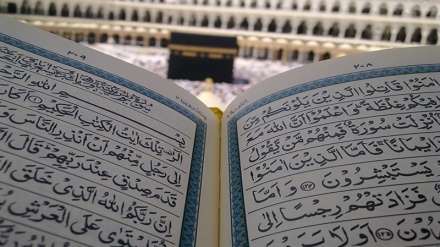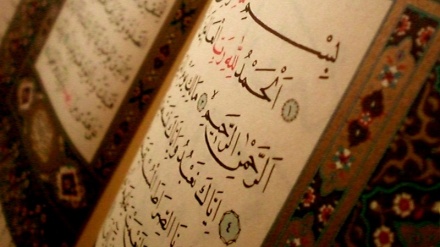Path towards Enlightenment (1026)
Salaam, and welcome to our latest episode of “Path towards Enlightenment”, which is an endeavour to make you and us familiar with an easy and fluent explanation of God’s Final Scripture to all mankind, the holy Qur’an that was revealed to the Last and Greatest of all Messengers, Prophet Mohammad (blessings of God upon him and his progeny).
As you know we have embarked upon explanation of “Surah Qalam” – the number 68 in the serial order of compilation of the holy Qur’an. Revealed in Mecca, it has 52 Ayahs and opens with a single discrete Arabic letter “Noon” and the Divine Oath by the instrument of “Qalam” or “The Pen”, as well as all knowledge that people are able to preserve and communicate thereby. It enumerates the noble characteristics of the Prophet of Islam and exhorts him to patience and steadfastness while rejecting the accusations of his foes who tried to mock him as insane. It exposes the vices of the enemies of Islam and referring to the inevitability of Resurrection and Final Judgement warns them of Divine Wrath.
A statement from the Prophet speaks of Divine rewards for those who recite Surah Qalam (regularly), while the Prophet’s 6th Infallible Heir, Imam Ja’far as-Sadeq (AS) says recitation of this Surah whether in the obligatory or supererogatory ritual prayers shall be immunity from the pressures of the grave for an observant Muslim.
We continue from where we left you last week and here are Ayahs 17, 18, 19, and 20:
“We indeed have tested them (the people of Mecca) just as We tested the People of the Garden (in Yemen) when they vowed they would gather its fruit at dawn;
“And they did not make any exception (for the poor, and failed to say: by Allah’s Will).
“Then a visitation from your Lord visited it (the Garden) while they were asleep.
“So by the dawn it was like (an already) harvested field (like a desolate spot).”
If you might recall, last Friday in our explanation of the previous Ayahs of this Surah we had said that arrogance on the basis of wealth and power leads to denial of religion and truth, and that is the reason the rich and the politically powerful were always the archenemies of the prophets of God, as was the case with the pagan Arabs of Mecca.
Here, in the Ayahs that we recited to you now, God Almighty cautions against feeling proud about wealth and number of children, by reminding of the fate of a certain family in Yemen which became ungrateful of Divine blessings. The owner of the garden was a God-fearing man who used to distribute parts of its crops among the poor and the needy, but when he died, two of his sons decided not to give anything in charity and to keep the produce for themselves despite the pleas of a third brother not to do so. The two were so confident of reaping the harvests that they did not even say “Insha Allah” or “If Allah Wills.” They kept the whole operation a closely guarded secret lest the needy come for taking what they used to get. Thus, Allah decided to destroy that season’s harvest in order to teach them a lesson.
These Ayahs teach us the following:
- Wealth and properties are Divine tests to determine how the owner uses them.
- Ingratitude leads to reduction of Divine blessings, while depriving the needy of their share results in the end of Divine favours, and could also bring Divine wrath.
- Human calculations are sometimes contrary to Divine Will and leads to unforeseen disasters.
Now let us listen to Ayahs 21, 22, 23, 24, 25, 26, 27, 28, and 29 of the same Surah:
“At dawn they called out to one another,
“Get off early to your field if you have to gather [the fruits].”
“So off they went, murmuring to one another:
“Today no needy man shall come to you in it.’
“They set out early morning, [considering themselves] able to grudge.
“But when they saw it they said, ‘We have indeed lost our way!’
“‘No, we are deprived!’
“The most moderate among them said, ‘Did I not tell you, ‘Why do you not glorify [Allah]?’
“They said, ‘Immaculate is our Lord! We have indeed been wrongdoers.’”
These Ayahs are a sequel to the previous ones and depicts the dismay of the two greedy and thankless brothers on visiting the garden the next morning to discover they were completely deprived of the produce, which was destroyed and reduced to ashes by a thunderbolt.
Ayah 28 quotes the third brother who was not a party to the plot of his two brothers and had cautioned them against depriving the needy of their share. He against rebukes them for their thanklessly and urges them to repent and glorify the All-Merciful Lord.
Ayah 29 refers to the repentance of the two erring brothers, their glorification of Almighty God and their admission of their guilt.
From these Ayahs we learn that:
- The All-Wise Lord has placed the share of the needy and the poor in the wealth and properties of the rich, who should give to the have-nots of the society or else will have committed sin that would bring about Divine wrath.
- Gratitude and charity increases Divine blessings while greed and avarice brings about downfall.
- Regret does not compensate the past, but helps in avoiding mistakes in future through scrutiny of deeds in order not to go astray.
- If repentance is sincere, there is hope and Allah turns loss into profit, but if repentance is not sincere, it becomes hypocrisy.
In conclusion of this week’s episode of “Path towards Enlightenment” we present you Ayahs 30, 31, 32, and 33 of Surah Qalam:
“Then they turned to one another, blaming each other.
“They said, ‘Woe to us! Indeed, we have been rebellious.
“Maybe our Lord will give us a better one in its place; indeed, we turn earnestly to our Lord.’
“Such was the punishment; and the punishment of the Hereafter is surely greater, had they known.”
The brothers at first tried to blame each other for the catastrophe that struck the garden, but soon realized their guilt, and admitting their disobedience of God, sincerely sought forgiveness with firm hope in Divine Mercy. Since their repentance was true the All-Merciful Lord gave them a better garden which yielded abundant produce. Ayah 33 says that this was a small example of Divine punishment, and the punishment in the Hereafter for those who do not repent is indeed more severe.
From these Ayahs we learn the following points:
- We should never blame others for our own faults.
- Sincere repentance is accepted in the Divine Court and results in blessings.
- Worldly punishment is temporary compared to the punishment of Hereafter.
- Allah’s infinite mercy provides wrongdoers the opportunity to repent, rectify beliefs, and make amends before death and closure of the doors of mercy.
RM/AS/SS


